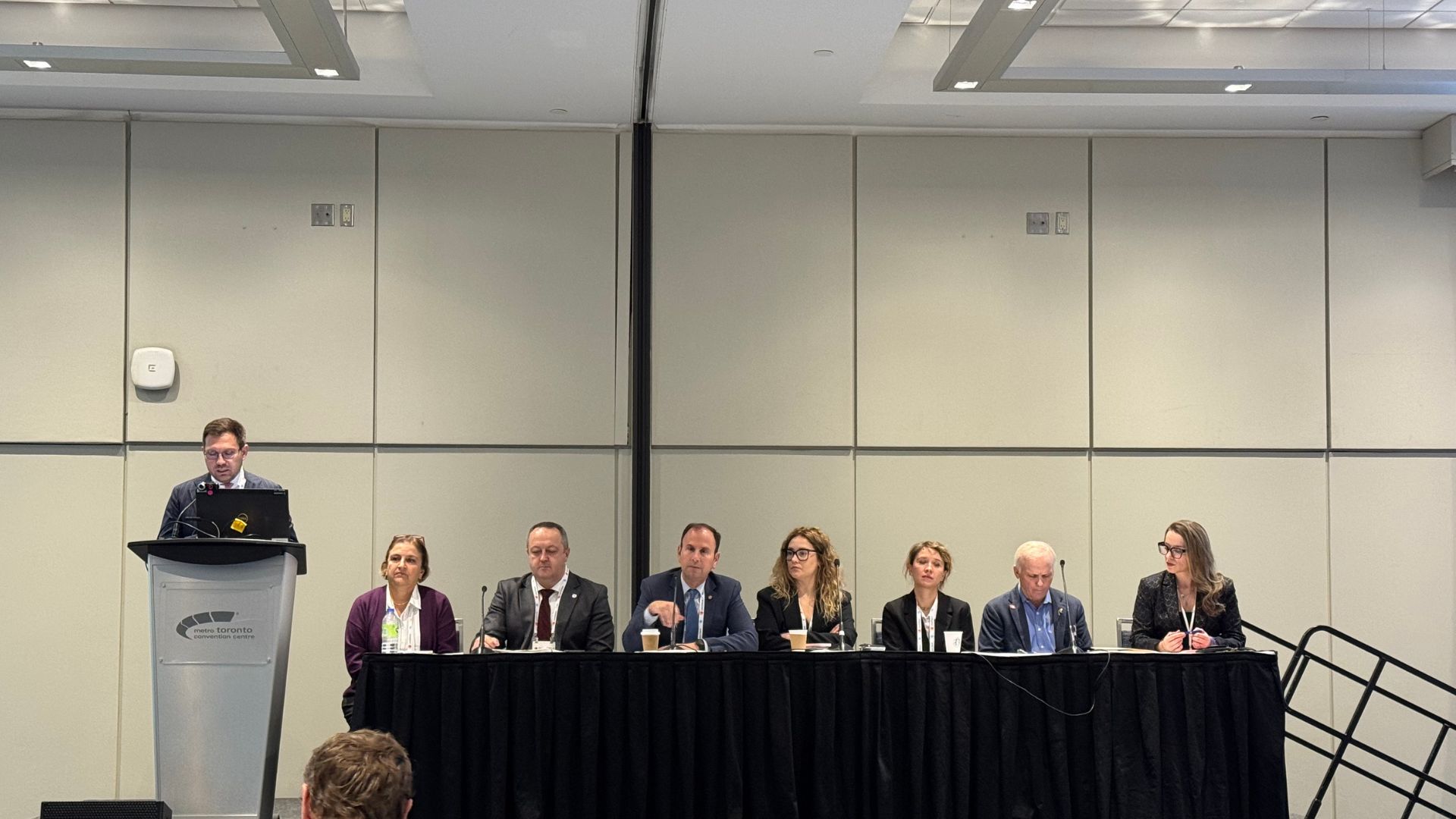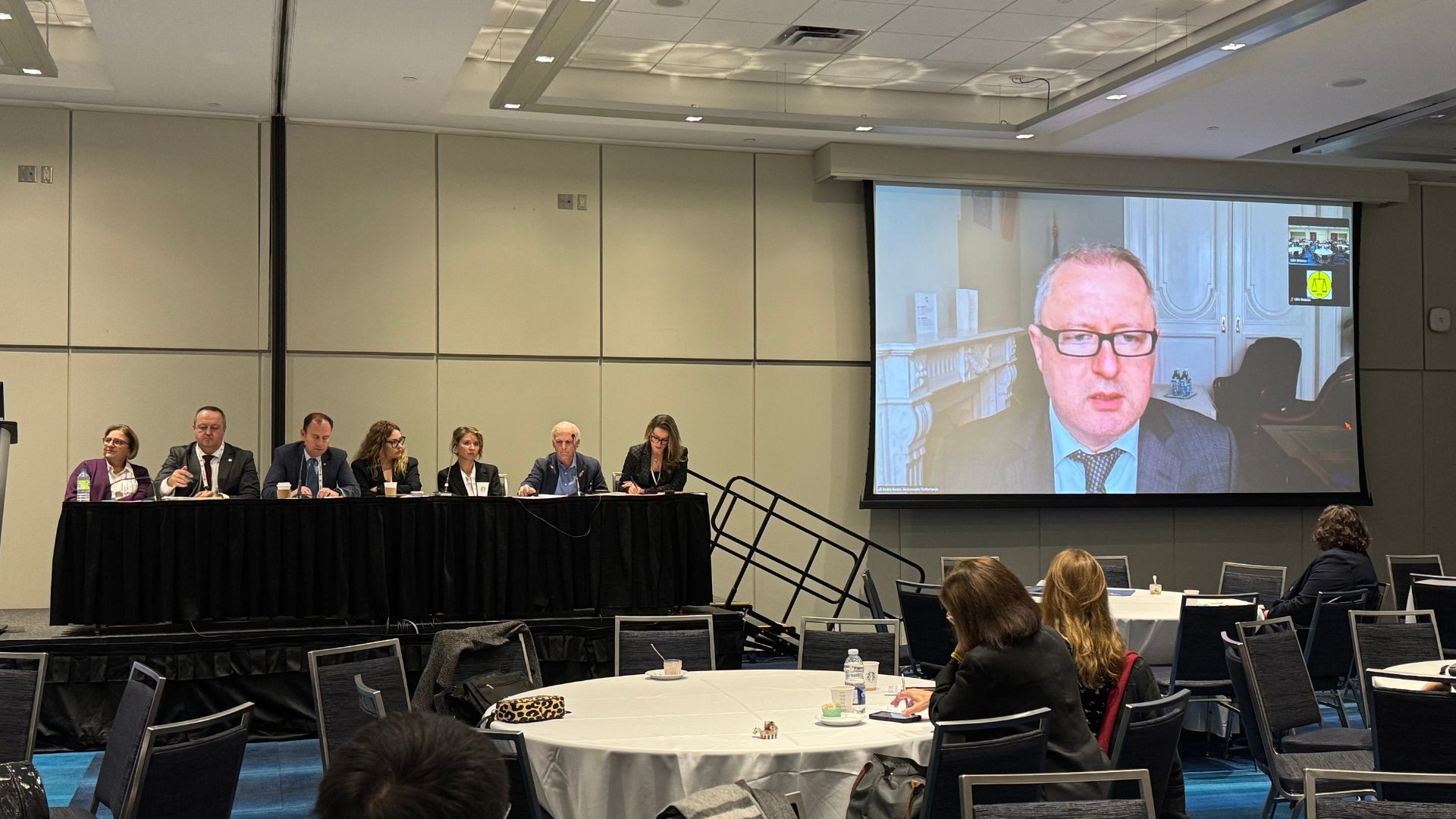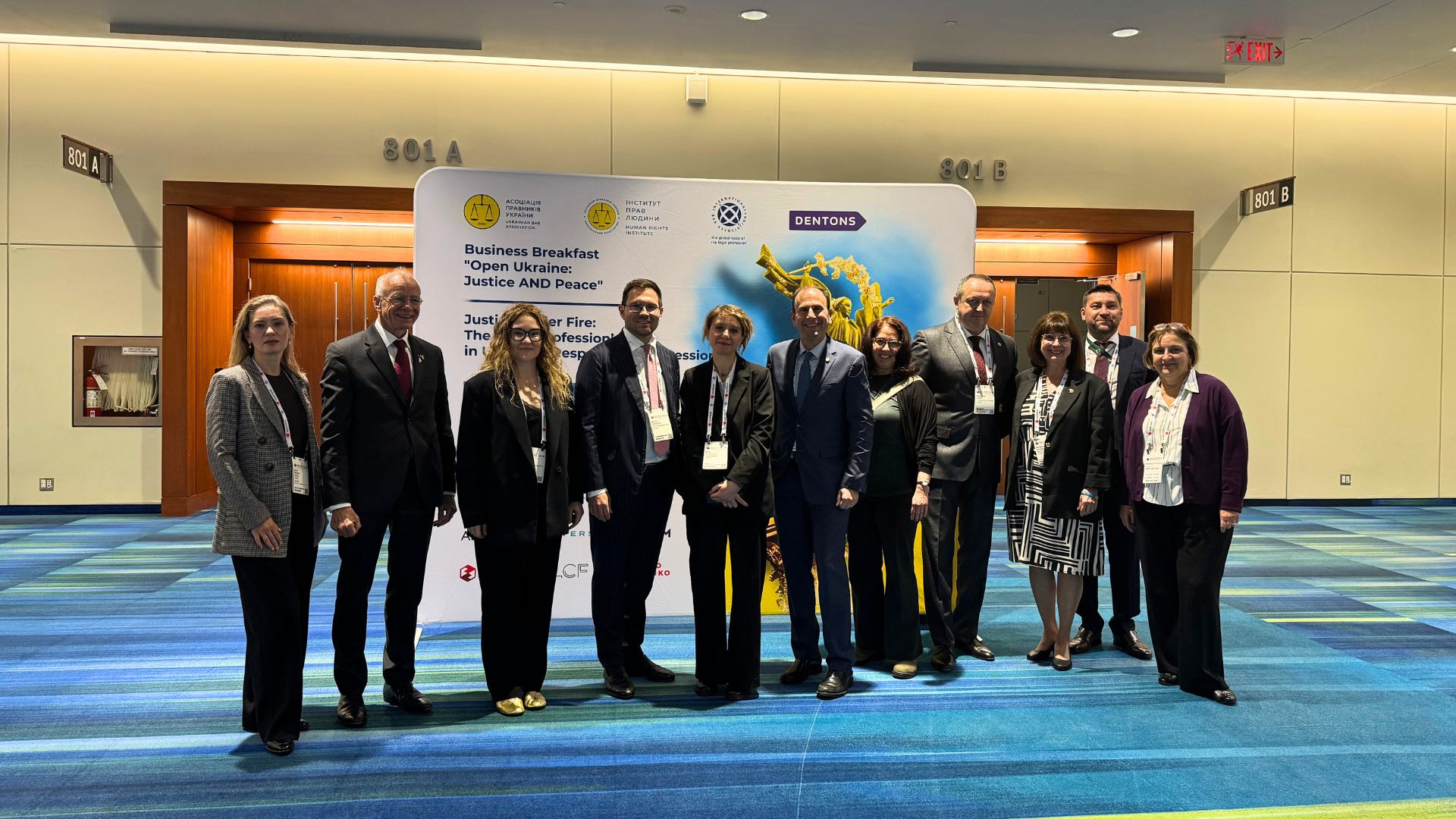Rebuilding Through Law: Business Breakfast “Open Ukraine: Justice AND Peace” Held in Toronto
On 3 November 2025, as part of the International Bar Association (IBA) Annual Conference in Toronto, the event “Open Ukraine: Justice AND Peace” took place — co-organised by the Ukrainian Bar Association (UBA) and the UBA Human Rights Institute. The event brought together leading Ukrainian and international experts to discuss how legal mechanisms can foster reconciliation, justice, and the restoration of trust in Ukrainian society after the war.
The event was opened by Mykola Stetsenko, President of the Ukrainian Bar Association, who expressed gratitude to the partners for their support and contribution to the organisation of the business breakfast “Open Ukraine: Justice AND Peace.” He extended special thanks to the International Bar Association for its consistent support of Ukraine and the Ukrainian legal community since the beginning of the full-scale invasion, as well as to law firms Aequo, Asters, Avellum, Integrites, LCF, Sayenko Kharenko, and to Steve Bujold for their individual commitment.

Mr. Stetsenko highlighted the significance of Canada’s involvement, as the first Western country to recognise Ukraine’s independence and one of its key partners today — providing comprehensive support ranging from economic to humanitarian assistance.
“There can be no recovery without justice,” the speaker emphasised, underlining that only genuine accountability for crimes and fair judicial proceedings can lay the foundation for lasting peace. He also shared alarming statistics on the consequences of the war: more than one-third of Ukrainians are facing mental health issues, 13% of households have sustained damage, and the unemployment and inflation rates in 2025 have both reached 12%.
In conclusion, Mr Stetsenko called on the international community to continue supporting Ukraine, particularly in matters related to the confiscation of Russian state assets and the establishment of reparation mechanisms. “Peace without justice is fragile. And we, as lawyers, carry the responsibility to ensure that no one and nothing stands above the law,” he summarised.
Participants of the event focused on justice system transformation, the restoration of human rights, and the role of the international legal community in supporting Ukraine. In particular, the discussion addressed justice for victims, institutional resilience, mechanisms of transitional justice, and Ukraine’s long-term legal integration into the European community.
The event was moderated by Stephen Rothstein, Former President of the Canadian Bar Association. Among the speakers were Alisa Kovalenko, filmmaker and servicewoman of the Armed Forces of Ukraine; Andrii Ovsiienko, Representative of the Ukrainian Parliament Commissioner for Human Rights on Judiciary Matters; Andriy Kostin, Prosecutor General of Ukraine (2022–2024) and Ambassador of Ukraine to the Kingdom of the Netherlands; Inna Liniova, Head of the UBA Human Rights Institute; Mark Ellis, Executive Director of the International Bar Association; and Ewelina Ochab, Senior Legal Advisor at the International Bar Association’s Human Rights Institute (IBAHRI).
During her remarks, Alisa Kovalenko underscored the importance of supporting survivors of conflict-related sexual violence (CRSV). She shared that in 2014, she herself had been held in captivity for several days, where she was subjected to sexual violence, becoming the first woman to officially testify about such an experience.
Kovalenko stressed that sexual violence is used as a weapon of war, yet most survivors remain silent due to deep societal stigma. She highlighted the significance of Ukraine’s interim reparations programme, as well as the need for continued support from international organisations and projects working directly with survivors.
Andrii Ovsiienko outlined the role of the Office of the Ukrainian Parliament Commissioner for Human Rights in the context of full-scale war. He emphasised that despite operational constraints caused by the aggression, the institution continues to exercise oversight over the observance of human rights — particularly in cases of mass violations — and works closely with vulnerable populations. According to the speaker, the effective protection of victims is only possible through close coordination of national efforts and strong international support.
Ewelina Ochab noted that in global practice, the lack of accountability for the most serious crimes has, regrettably, become a common reality. She stressed that it is the responsibility of legal professionals, civil society, and international organisations to reverse this trend and ensure that justice is inevitable. The speaker paid special attention to universal jurisdiction as a crucial tool in holding perpetrators accountable for genocide and crimes against humanity, regardless of where and by whom they were committed.
Mark Ellis highlighted the uniqueness of Ukraine’s experience in the field of justice during the active phase of war. He noted that Ukraine stands out as a rare example of a state conducting investigations and trials for war crimes in real time, while hostilities are still ongoing. In his view, this phenomenon deserves profound respect from the international community and reflects Ukraine’s firm commitment to ensuring justice under even the most difficult circumstances.
Andriy Kostin emphasised that Ukraine’s struggle is not only about territorial integrity but also about achieving justice for all victims of aggression. Since the beginning of the full-scale invasion, the state has been implementing the doctrine of a “web of accountability” — an approach that encompasses five interconnected elements and is based on the Peace Formula proposed by the President of Ukraine and supported by international partners. One of its key pillars is national investigations: over 190,000 criminal proceedings have been opened, more than 37,000 of them concerning civilian deaths — including 664 children.

Mr Andriy Kostin placed particular emphasis on conflict-related sexual violence (CRSV). He noted that a specialised unit within the Office of the Prosecutor General of Ukraine is currently investigating 385 such cases. Ukraine has also enacted a law on interim reparations for victims, allowing survivors to receive support without waiting for a court verdict. He expressed gratitude to the International Bar Association for introducing the eyeWitness to Atrocities tool in Ukraine — a secure and reliable method of documenting war crimes, with evidence already being used in Ukrainian courts.
According to Mr Kostin, Ukraine actively cooperates with the International Criminal Court (ICC). Six arrest warrants have already been issued against members of the Russian leadership — including for the deportation of children and attacks on critical infrastructure. The ICC has established a field office in Ukraine, and one of the new investigations concerns systematic sexual violence against prisoners of war.
In her remarks, Inna Liniova highlighted the critical importance of thorough evidence analysis in war crimes cases and the need for consolidated efforts between national and international partners in this field. She noted that over 190,000 criminal proceedings related to war crimes have already been registered in Ukraine, with the number continuing to grow. The Ukrainian Bar Association contributes to processing this information by monitoring criminal trials and analysing court rulings in war crimes cases.
Ms Inna Liniova placed particular emphasis on human rights protection within criminal proceedings. She stressed that Ukraine needs high-quality, fair justice not only to meet international obligations but first and foremost as a matter of national interest. At the same time, she noted that both defence lawyers and law enforcement officers often face pressure — from the public and state authorities alike — including public criticism in the media. There have also been documented cases of direct threats via messaging apps, letters, or emails, which constitute serious violations of the principles of due process.
Ms Liniova also addressed the challenges in officially notifying suspects, particularly Russian military personnel. Due to lack of access to conventional communication channels, public government platforms are being used — a measure that, while not standard under international practice, is currently necessary. Concluding her remarks, the Head of the UBA Human Rights Institute highlighted the importance of the mentorship programme for Ukrainian judges, prosecutors, and defence attorneys that is being implemented by the UBA jointly with the IBA, which she said is already showing tangible results.
During the discussion, the experts also shared their views on how to strike a balance between accountability and national reconciliation, as well as how the international legal community can support Ukraine on its path from resistance to renewal.

The Ukrainian Bar Association and the UBA Human Rights Institute express their gratitude to the International Bar Association for its unwavering support for Ukraine and Ukrainian legal professionals, as well as for co-organising the event. Special thanks go to the partners of the “Open Ukraine: Justice AND Peace” breakfast — Aequo, Asters, Avellum, Integrites, LCF, Sayenko Kharenko, and Steve Bujold — for joining forces to create a space for meaningful dialogue about the future of justice in Ukraine.
